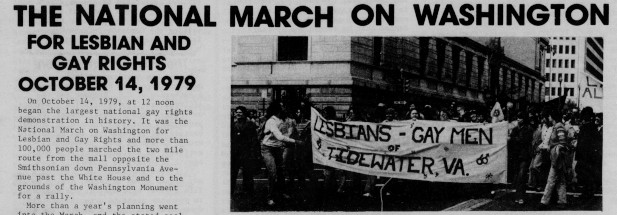“For Love and For Life, We’re Not Going Back.” These words appeared as the banner heading in the October 1987 issue of Richmond Pride above various articles concerning the soon-to-be-held October 11, 1987, March on Washington for Lesbian and Gay Rights. They also perfectly summarize the importance of LGBTQ+ History Month.
The first LGBTQ+ History Month took place in October 1994, founded by Missouri school teacher Rodney Wilson in conjunction with other teachers. Although at that point it was called “Lesbian and Gay History Month,” the celebration was created in order to educate the public about the LGBTQ+ community at large. The group felt that LGBTQ+ contributions to culture and history were often overlooked and that calling attention to the need for more inclusive stories allowed all people to participate in a more complete history. Wilson chose October because both the 1979 and 1987 marches on Washington for Gay and Lesbian Rights took place in October, along with the fact that National Coming Out Day is celebrated on October 11th. These individual anniversaries and celebrations could now be joined into a season of awareness for the LGBTQ+ community to share and take pride in their history. While previously erased, hidden, and misrepresented in the telling of American history, LGBTQ+ History Month gives community members the platform to articulate that LGBTQ+ people have always existed, their stories matter, and they will not be silent.
LGBTQ+ Programming
In order to bring visibility to LGBTQ+ history in Virginia, the Library of Virginia will host various programs throughout the month of October. From topics of law, love, and everyday life, this diverse selection of events hopes to highlight different aspects of LGBTQ+ history and how this history has enduring value.
October 5th – Panel Discussion: Virginia LGBTQ+ Communities, Politics & the Law
6:00pm – 7:30pm: LVA Lecture Hall
Since Virginia’s founding, government institutions have shaped the experiences of its citizens whose sexual orientation, gender identity, and expression or sex characteristics do not conform to societal expectations. In addition to prohibiting sexual acts, lawmakers and courts have determined Virginians’ right to marry, become parents, access healthcare, and seek legal remedies against discrimination. A panel of speakers will discuss Virginia’s LGBTQ+ history through the lens of law and government. Reflecting on discrimination, stigmatization, LGBTQ+ community-building, and political activism, panelists will speak to the importance of LGBTQ+ voices in the state’s civic institutions.

October 17th – Common Ground Virginia History Book Group: Burn the Page
6:00pm – 7:30pm: Virtual Event
In the month of October, the Common Ground Book Group will discuss Burn the Page: A True Story of Torching Doubts, Blazing Trails, and Igniting Change by Danica Roem.
October 21st – Archives Month and Queer Commonwealth Event: Library of Virginia Tour and Zine-Making Workshop
Two sessions: 12:00- 2:00pm and 2:00pm – 4:00pm
Celebrate LGBTQ+ History Month and Archives Month in Virginia with the Library. Take a tour of the Library highlighting LGBTQ+ materials in our collections and learn about the important role of government archives in actively preserving and making accessible the records of our civic actions. Then learn about the history of zines and use reproduction collection materials and information from the tour to create your very own zine—a booklet created, written, and designed by you.
LBGTQ+ Virginia 100 Years Ago: Exhibit Cases
In exhibit cases located by the 2nd floor circulation desk, Library staff pulled together some interesting items from the Library’s holdings to highlight LGBTQ+ history in Virginia 100 years ago. Focusing on the 1920s, the cases emphasize that LGBTQ+ history is not modern or new, but is deeply part of Virginia history.
One case will display the overlap of LGBTQ+ history and literary history through The Reviewer, a literary magazine of the period whose creators brought together talent from across the South while also making Richmond (Va.), a hub for LGBTQ+ camaraderie and culture.
The other case focuses on the T.M. Fleear letters, 1921-1923, a component of the Virginia Department of the Treasury’s Unclaimed Property Records. While only a handful of letters, the correspondence between “Mr. T.M. Fleear” or “Jonnie” and “R.C.” or “Roy” alludes to a complicated romantic relationship between two men as they navigate a society that stigmatizes and even criminalizes their relationship. You can read more about this collection in the August 2022 blog post “Dear Jonnie.”
LGBTQ+ Research Guide
In addition to the exhibit cases and events this LGBTQ+ History Month, the Library of Virginia will also be sharing the newly created “Queer History Research in Virginia” guide. This guide will be available alongside other digitally available guides on the Research Guides & Indexes page.
Due to the complicated nature of researching LGBTQ+ history, this guide aims to assist researchers by providing research strategies as well as basic Virginia legal history as it relates to LGBTQ+ individuals. This guide also highlights both published and archival resources in LVA’s holdings while also listing various external resources including databases, collections, and digital projects hosted by other cultural institutions that may be of most benefit to researchers exploring LGBTQ+ history.
Please check back in the month of October for the published guide.
For Love and for Life
Whether it is for yourself, for a friend, or a loved one, consider taking time this month to learn more about LGBTQ+ history. Attend an event, read a book, or click through a digitized publication, whatever medium you are most comfortable participating in, and seek out information through the Library of Virginia, or various other cultural institutions.
















